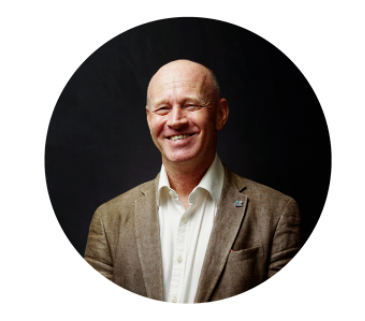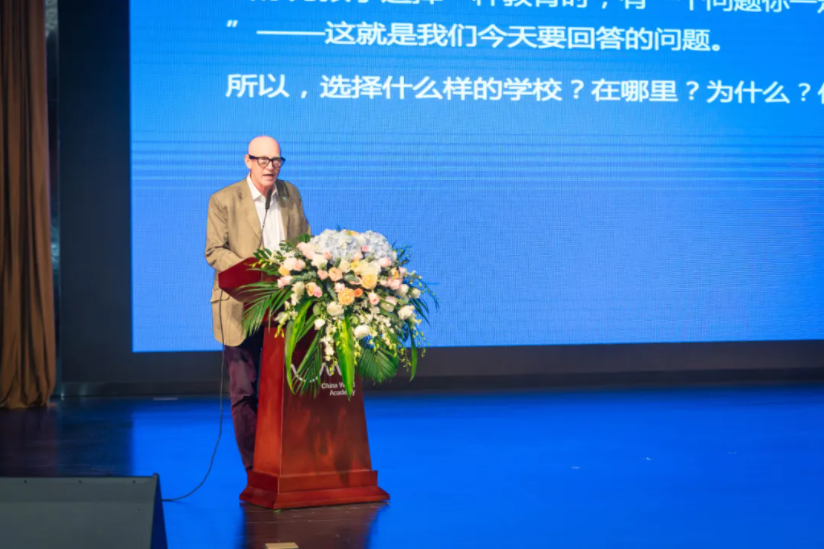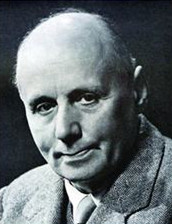Does International Education in China Need to be Localised?
Issue date:2020-11-19 
Pelham Lindfield Roberts
Speech by Pelham Lindfield Roberts, Principal of UWC Changshu China at CWA International Education Forum.
In Yuval Noah Harari’s 《21 Rules for the 21st Century》 his chapter on Education is subtitled “Change is the only constant”. He writes:“ How can we prepare ourselves and our children for a world of such unprecedented transformations and radical uncertainties.” What should we teach our children that would help them survive and flourish in the 21st-century? What kind of skills will they need in order to get a job or to understand what is happening around them to navigate the maze of life?
When you choose an education for your child one question you ask is “local or global” – and this is the question we address today.

Speaking at CWA International Education Forum
Does international education in China need to be localised?
So,what kind of school, where and why? What really matters for our children?
I speak as a parent of three boys who we have chosen to educate internationally not nationally …for us that meant moving to southern Africa so they could learn and so we could learn as a family. They were aged 13, 11 and 6. Until this point our family had been in Europe: we then took a decision that their education would be best supported by the experience of living and attending school in Swaziland: Little did we know where that would lead, we had no game plan, no long term strategy, it was just the right thing to do because we wanted our children to have an international outlook and because we were confident the experience was more valuable than any curriculum content.
After Swaziland we moved. Our children studied in all these countries, travelling with us or on their own, to South Africa, the United States, India, Canada, Costa Rica, Norway and China and applied to University and went to UBC, Princeton and Brown. Their choice, their decision, their life…

My wife Ulrike and I with our sons
I am Canadian and British, my wife is Austrian and Scottish. I spent 10 years as a soldier, served as an officer in the special forces, represented a Non-Governmental Organisation in Cambodia. I have studied at 5 universities including much of a doctoral degree in Educational Policy and Organisational Culture at Bath. I have been a Principal examiner for the IB and worked on IB curriculum development. I have been Head of schools in Europe, Africa, North America and India.
I am now Principal of UWC Changshu, in China. I am still young... even if my knees object. I care about our world and I care about humanity and I work in education because our children and our children’s children will have to solve the problems caused by our parents and their parents. And the problems they have to solve will be global problems requiring global solutions.
If I am asked where I am from I have no real answer. The house we call home is in Wales, and it has been very important for us to have a home base we regularly return to. It is an old house, almost 300 years old. It is an emotional and physical foundation. We all need to have a sense of our roots, or the foundation of our identity.
In 2005 we made a decision to expose our children to a global rather than a local context; as a consequence my children have travelled the world and had amazing opportunities.
What children learn beyond the formal curriculum, their attitudes and values, social competencies and skills is what an international education can provide. Academic grades may provide the key to the door but everything else allows your children to open the door, to step in and to be successful in a global world.
We wanted our children to be able to go anywhere and do anything. We wanted no door to be closed to them … at least to have as many doors open as possible.
But what is education really all about? The right to happiness has been defined by philosophers and prophets and by ordinary people as the supreme good … happiness as the sole purpose of life.
As every principal knows happy children means happy parents!
In the 19th century education was developed by the large industrialised nations such as Britain, Germany, France, and Japan as systems to strengthen the nation rather than to ensure individual well-being, the idea was that having happy industrialists was enough … well that was the idea but as we know not everyone agreed and some felt that workers had a right to be happy too!
And parents chose national schools to allow their children to access the corridors of power …
In social psychology it is a well known characteristic of groups that they will form norms, unwritten social rules that only those who are in really know. This can be formalised as expectations of behaviour which keep people out who don’t know the rules. Often the social rules are made so complex that only those who have had the right education can possibly know the rules. At Princeton only those voted for can join the Ivy Dining Club and Harvard, Yale, Oxford and Cambridge all have their own secret societies, their rules of membership.
Knowing the rules allows you to play. If you don’t know the rules, you falter, lose confidence, fail to succeed. Education; local, national or international is also about learning the rules of the game, how to dress, how to talk, what to say, what not to say. There are different rules locally and nationally and internationally and to be really confident you need the social intelligence, empathy and aptitude to be able to learn.
So how many of you know the rules of cricket?
In English private schools, cricket was the game that the social elite played, especially after football was taken over by the masses. The rules are so complex that only after years in school can you really begin to understand them, let alone play the game.
The rules are absolutely confusing, but they are like social rules designed to keep people who had not been to the right school OUT. You have to learn the rules of cricket to be able to play, to participate comfortably. And your children returning to China need to know their home rules.
In 2011 when the Prime Minister of China, Wen Jiabao, visited England, he asked to visit Stratford upon Avon, the home of William Shakespeare. He spoke about how literature and culture are a bridge between nations.
Whilst he had read Kling Lear as a boy he wondered about how many Englishmen knew the Monkey King of Chinese literature.
Wen Jiabao challenged those he met by saying he would never seek to negotiate with another country without seeking to understand the history and culture of the country he was working with.
Wen’s words echo those of Sunzi from 2000 years ago, “Know yourself and know your enemy and you will survive 100 battles.”
In choosing an international education we allow our children the chance to understand the language and culture, the international rules which will open doors for them so that they can confidently move from one context to another. These rules are not learnt by reading a book. They are learnt through experience.
One Chinese rule I want to remind you of helps us answer this question: “A tree may grow to a thousand feet, but the leaves still return to their roots”
And a tree needs strong roots. In order to understand something foreign it is essential to have a strong foundation. In seeking the international do not ignore the national. To have the confidence to explore needs confidence and certainty, a strong foundation of culture and values of language and literature.
Our students, our children need to be good chefs…to understand the ingredients to make a wonderful recipe, to combine many bits of information into a broad picture of the world. But the fundamental ability to cook will always have a strong foundation in one cuisine, a starting point from which to adventure and explore. Only with self-confidence will it be possible to value difference, and not be threatened by it.
And this is the answer to my question: Does international education in China need to be localised? Yes absolutely, in order to be able to be a responsible global citizen, to value opportunities to learn from diverse contexts and situations and people, it is necessary for our children, the next leaders, to have a strong local foundation.
Imagine yourself as an astronaut, looking down from space and you will be likely to arrive at some astounding insights about our planet earth. Young children, can imagine this very well but as they spend time in school learning facts and figures, their imagination, creativity and empathy are driven away, with times-tables and frowns which greet their day dreaming. We need clever astronauts, young people who lie on the grass and look at the sky and the planets and the clouds passing by, developing imagination, developing empathy, developing understanding, being able to view their reality from another perspective. Being inquisitive, asking questions, seeking answers. If they can do so they will develop a valuable life skill.
I have met a couple of them and I understand that most if not all of the 553 people who have left the earth’s orbit talk of the amazing realisation they have as they look back at earth. They see its beauty and understand its fragility. Our children need to be as confident as an astronaut, able to leave home, to be able to look back, to be able to judge what they discover against a strong benchmark of their own culture, to value what they have and to imagine a different future for all of us.
By giving our children a strong local foundation and a global education we are allowing them to travel in space, to look back at their home gaining greater understanding, greater perspective, greater appreciation.
An international education is like being an astronaut but as we cannot all go to space; we can however view ourselves through the eyes of another. By deliberately building diversity into our learning communities and building the capacity for empathy for alternative perspectives.
Our students need imagination to solve the complexities of their age, they need to learn to see their world from different perspectives.
Peter Senge, author of the Fifth Discipline, who you will know for his work on Systems Thinking and Learning Organisations says “Extraordinary change requires building extraordinary relationships, and at some level this requires gathering together diverse people representing diverse views so they can speak and listen to one another in new ways.” We have to imagine a different future and provide our students with an education which will allow them to see the positive potential of working with diversity.
The world our students will inherit will be more challenging and more complex than ever faced by any previous generation; temperatures are rising, the polar icecap is melting, disparities in wealth are increasing, populations are growing, resources are diminishing and the walls which will protect our grandchildren are rising, by necessity, higher and more isolating.
In our local and global context, socially, politically, religiously, economically, we see increasing polarisation, fear and protectionism. We can and we must “create a different future” by building diversity of perspectives in our communities of learners!
International education in China need to be localised. Build strong foundations of security and safety in the minds of your children, give them the confidence to explore; trust them to lead; explore with them into the unknown where there are multiple ideas. The world needs them and they need the world.










